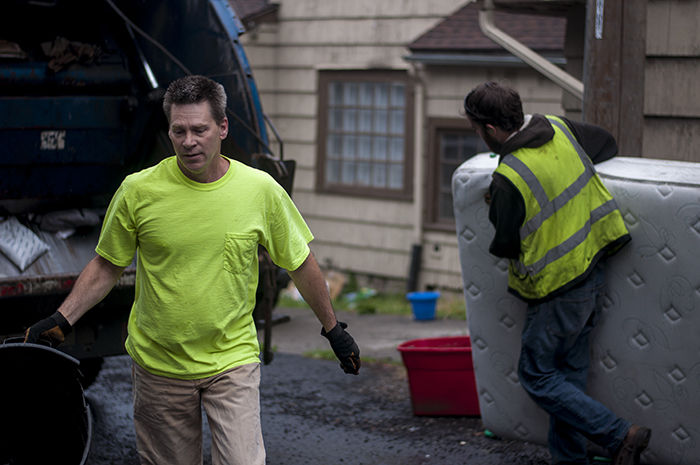Trash crews clear move-out mess
June 7, 2017
Mike Held and Dane Felsted pilot their garbage truck through the streets of College Hill in the early morning, stopping to collect trash and heaps of abandoned furniture as they go.
One couch, two couch, three couch, four.
Mattress, table, desk and drawer.
It’s a quarter past 6 a.m., June 1 — the day after the leases end. The day after College Hill residents haul to the curb the belongings too difficult to bring with them.
The day Pullman Disposal Service (PDS) begins to clean up one of their biggest messes of the year.
“Usually, we don’t start till 7,” Held says, “but I figured it was gonna be a bad day.”
The first three stops, along Maple Street, aren’t so bad. A wooden lawn chair at one, a white shelf at another, but mostly run-of-the-mill trash. The fourth stop is a different story: two dog beds, several rugs, a queen-sized mattress, another wooden chair and a faded orange loveseat.
Held, 53, and Felsted, 22, PDS employees, heave the jumbled furniture piece by piece into the truck’s hopper. A blade crushes and shreds the objects too large to be swallowed whole, and then scoops the scraps into the machine’s bowels. One pile down.
The next is worse.
On one side of the alley, an assortment of household fittings spans the length of a house and an adjacent shed. However, Held tracks which locations have an account with PDS and which do not. This one doesn’t.
He says the company sometimes makes arrangements with the city to dispose of these “extras,” but otherwise the unwanted junk sits there indefinitely. Some things disappear over time, as they catch the eyes of opportunists.
“If you’re on a real tight budget and you need to furnish a house …” Held muses. He turns, looks behind him. “See, there’s a nice leather couch.”
The location across the street does have an account. It also has a mound of garbage, much of it clothing, on the ground beside an overflowing trashcan. Held notes that one of the most helpful and considerate things people can do is to put their garbage either in a can or in a tied bag.
Held circles the pile, taking pictures on his cell phone as evidence for extra charges.
He says this is roughly three yards of garbage, and that a crew working the day before cleaned up 40 yards at one stop. The job took an hour and a half. After half an hour of work, they charge for labor.
Fortunately, he says, this isn’t a common occurrence.
“Until you get to move-out time,” he adds, “then it gets pretty hectic.”
According to Devon Felsted, Dane Felsted’s father and president of PDS, the company hauled an average of about 1,040 tons of trash per month to the Whitman County landfill from January to June of 2016, excluding May.
In May, the tonnage jumped to about 1,320, a more than 25-percent increase. Garbage collectors tend to work extra hours in this month.
Held and Dane Felsted begin shoveling the loose debris, flinging it into the truck. As they dig, they occasionally uncover something worth keeping, like a pair of tennis balls.
“Kids in little league gotta have practice balls,” Held says.
PDS allows its employees to take things from the trash, for the sake of keeping perfectly good items out of the landfill. Sometimes, they receive calls from customers saying they didn’t mean to throw something away, and if that item has been saved they can easily return it.
Held stoops to grab something else. He comes up with an iron dumbbell and a wry smile on his face: “You into weightlifting?”
After 10 minutes or so, they’ve collected everything and hop into the truck. A couple more stops along Palouse and Maple Street complete the first loop, and they head toward Oak Street.
The area in between, which Held regards as “a nasty spot,” is not on their route.
“Let’s see what this side looks like for the guys tomorrow,” he says, surveying the right side of Maiden Lane. “Oh, it’s not so bad.”
Farther down the road, he pulls up to their next stop.
“I knew this was gonna be bad,” he says.
More furniture piles dot the alleyway. Shelves, sofas, ottomans, a punching bag and exercise apparatus. Overflowing dumpsters.
Some items, like an orange-and-white traffic barrel with four rectangles cut out at roughly eye and arm level — “it amazes me the things they make” — are stranger than others. Times like these Held wonders at the story behind garbage.
More often, he wonders why people throw away the things they throw away. The still-wearable clothes and shoes, the still-usable equipment. He recently found a discarded set of high-end Bose speakers.
Other things, Held says, seem especially wasteful — the couches and chairs and desks that could have been donated. He notes that there are even places, like Palouse Treasures, that will retrieve these things themselves at no cost to the donor.
“But then again,” he says, “you’ve got people who don’t wanna take the time. It’s easier to throw it outside your door.”






















